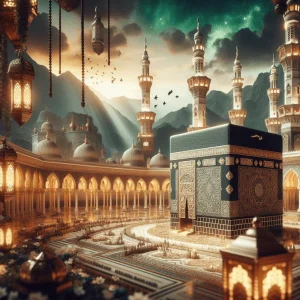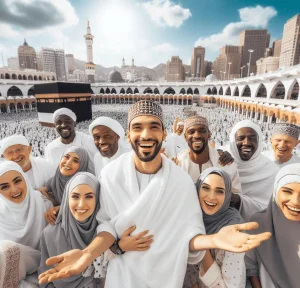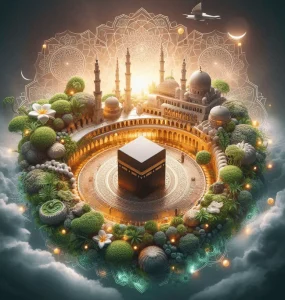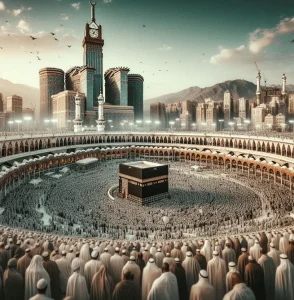Table of Contents
Ramadan Each year, millions of Muslims worldwide embark on a profound spiritual odyssey during Ramadan. This sacred month, the ninth of the Islamic lunar calendar, is much more than a period of fasting. It’s a time of deep reflection, heightened devotion, and communal unity. The essence of Ramadan lies in its ability to transform hearts and minds, fostering a sense of spiritual rejuvenation and moral clarity. Let’s delve into the multifaceted significance of Ramadan and uncover the true power behind this spiritual journey.

Historical and Religious Significance
Ramadan holds a place of paramount importance in Islam, commemorating the first revelation of the Quran to Prophet Muhammad by the archangel Gabriel. This divine event, known as Laylat al-Qadr or the Night of Power, is believed to have occurred during the last ten nights of Ramadan. The Quran, a guiding light for Muslims, was revealed as a source of wisdom and spiritual guidance, making Ramadan a time to reconnect with the divine message.
The Pillar of Fasting
One of the Five Pillars of Islam, fasting during Ramadan (Sawm) is obligatory for all adult Muslims. From dawn until sunset, Muslims abstain from food, drink, and other physical needs, exercising self-discipline and self-control. This practice of fasting, known as Sawm, is not merely a physical act but a profound spiritual exercise. It cultivates a sense of empathy towards the less fortunate and strengthens one’s faith.
The Pre-Dawn Meal: Suhoor
The day begins before dawn with a meal called Suhoor. This meal is essential as it provides the necessary sustenance to endure the day’s fast. Families gather in the quietude of the early morning, sharing not just food but also prayers and supplications. Suhoor is a cherished moment of togetherness and preparation for the day ahead.
The Breaking of the Fast: Iftar
As the sun sets, the fast is broken with a meal called Iftar. Traditionally, this begins with the consumption of dates and water, emulating the practice of Prophet Muhammad. Iftar is a joyous occasion, often shared with family and friends, featuring an array of delicious dishes. It’s a time of gratitude and celebration, reflecting on the blessings of the day.
Spiritual Practices and Reflection
The power of Ramadan lies in its ability to elevate spiritual consciousness. Muslims engage in increased prayer, reading of the Quran, and acts of charity. The nightly Taraweeh prayers, performed in congregation, are a unique feature of Ramadan, where long portions of the Quran are recited. This nightly devotion reinforces the communal and spiritual bonds among worshippers.
Quranic Recitation and Reflection
Reading and reflecting on the Quran is central to the Ramadan experience. Muslims aim to complete the entire Quran during the month, often in special sessions called Khatm. This practice fosters a deeper understanding of the divine message and its relevance to everyday life. The Quran’s timeless wisdom offers solace, guidance, and a renewed sense of purpose.
Laylat al-Qadr: The Night of Power
Laylat al-Qadr, occurring in the last ten nights of Ramadan, is a night of immense spiritual significance. It is believed to be the night when the Quran was first revealed, and it is said that acts of worship performed on this night are equivalent to a thousand months of worship. Muslims spend this night in prayer, seeking forgiveness, and making heartfelt supplications. The exact date of Laylat al-Qadr is not known, adding to the sense of anticipation and devotion in these final nights.
Acts of Charity and Generosity
Ramadan is a time of heightened charity and generosity. Muslims are encouraged to give Zakat, an obligatory alms-giving, and Sadaqah, voluntary charity. These acts of kindness are a means to purify wealth and to assist those in need. The communal aspect of Ramadan is evident in the collective efforts to alleviate poverty and support the underprivileged.
Zakat al-Fitr
At the end of Ramadan, Muslims give Zakat al-Fitr, a form of charity that ensures the less fortunate can celebrate Eid al-Fitr, the festival marking the end of Ramadan. This act of charity underscores the themes of unity and compassion, ensuring that everyone, regardless of their socio-economic status, can partake in the joyous celebrations.
The Culmination: Eid al-Fitr
The conclusion of Ramadan is marked by the festival of Eid al-Fitr, a day of immense joy and gratitude. Muslims gather for a special prayer service, followed by feasts, exchanging of gifts, and social gatherings. Eid al-Fitr is a time to celebrate the successful completion of the fast and to express thanks for the strength and patience granted during Ramadan. It’s a moment of communal harmony and joyous festivity.
Personal Transformation and Growth
The journey of Ramadan is deeply personal, fostering significant spiritual and moral growth. The discipline of fasting teaches self-restraint and empathy, encouraging Muslims to lead a life of integrity and compassion. The increased acts of worship and reflection during Ramadan help to purify the soul, instilling a sense of inner peace and contentment.
Strengthening Family and Community Bonds
Ramadan is also a time to strengthen familial and communal bonds. Families come together for Suhoor and Iftar, creating cherished memories and reinforcing ties. The communal prayers and charitable activities foster a spirit of unity and cooperation within the community. This collective experience enhances the sense of belonging and mutual support.
Developing a Healthier Lifestyle
Fasting during Ramadan can also lead to physical benefits, promoting a healthier lifestyle. The abstinence from food and drink allows the body to detoxify and rejuvenate. Many Muslims find that is an opportunity to break unhealthy eating habits and adopt a more balanced diet. The emphasis on moderation and discipline can lead to lasting positive changes in lifestyle and wellbeing.
The Universal Appeal of Ramadan
The universal appeal of Ramadan lies in its timeless values and the profound impact it has on individuals and communities. Regardless of cultural or geographical differences, the essence of resonates with Muslims worldwide. It’s a month that transcends boundaries, uniting the global Muslim ummah in a shared spiritual experience.
Building Bridges Across Cultures
Ramadan also serves as a bridge between cultures, fostering understanding and respect. Non-Muslims are often invited to join in Iftar meals, providing an opportunity to learn about Islamic traditions and values. These interactions promote mutual respect and contribute to a more harmonious coexistence.
Highlighting the Universal Themes
The themes of self-discipline, empathy, charity, and community that define Ramadan are universally relevant. They resonate with people of all faiths and backgrounds, highlighting the shared human values that bind us together. Offers a powerful reminder of our collective responsibility to create a just and compassionate world.
Ramadan
The power of Ramadan lies in its ability to transform lives through a profound spiritual journey. It’s a month of fasting, prayer, reflection, and charity that fosters personal growth, strengthens communal bonds, and promotes universal values. As the crescent moon marks the beginning of, Muslims around the world embark on a path of spiritual renewal, guided by the timeless wisdom of the Quran and the exemplary life of Prophet Muhammad. The journey of is a testament to the enduring power of faith, resilience, and the human spirit.





More Stories
A Journey Through Islamic History: Must Visit Muslim Destinations
Journey of Faith: Finding Peace and Inspiration at Nabawi Mosque
Your Ultimate Retreat at Safa Tower Hotel Madinah